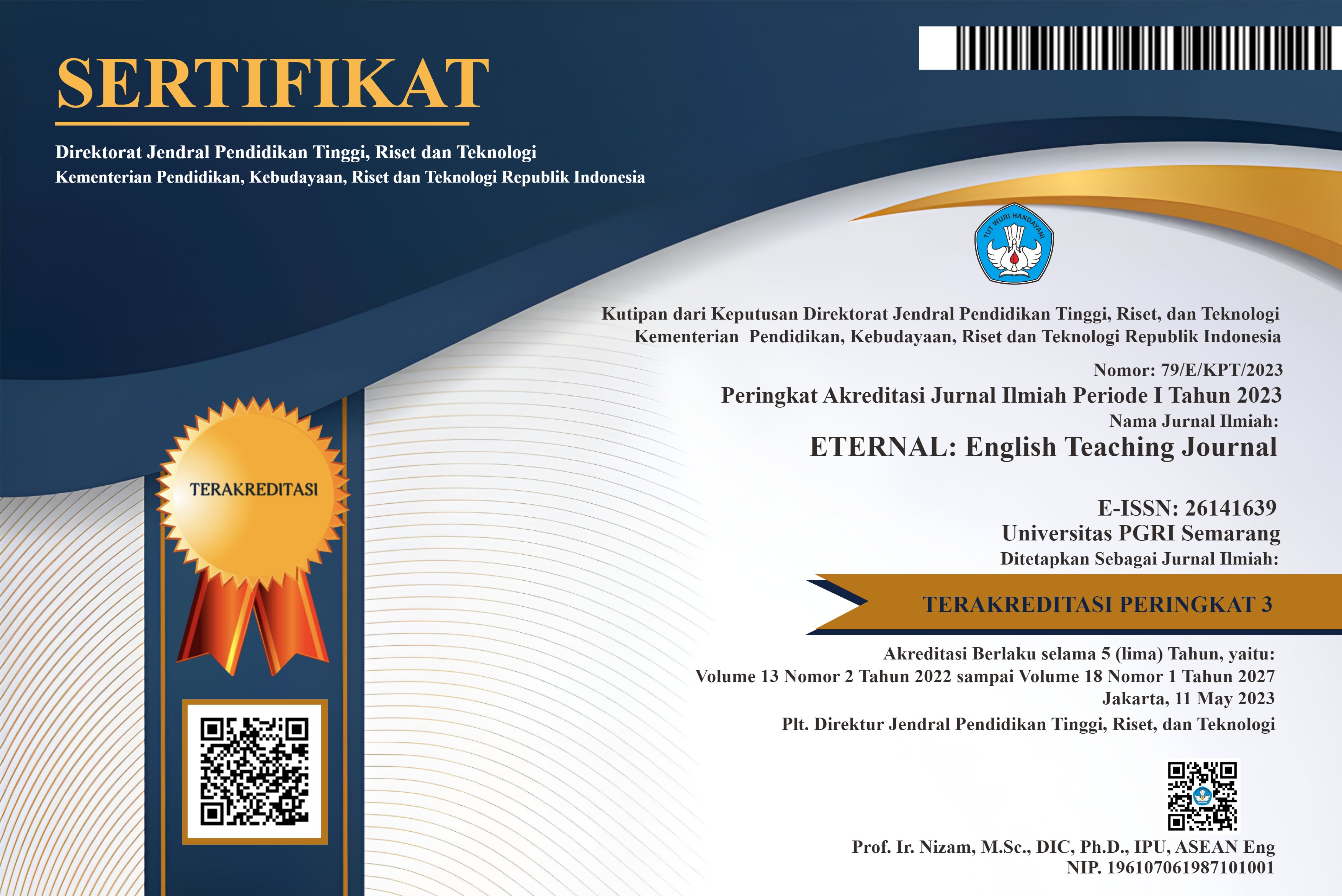Practical Application of Assessment Theories for English Teacher through Digital Technologies
DOI:
https://doi.org/10.26877/eternal.v15i2.830Keywords:
Digital assessment, EFL classrooms, web-based applications, educational technologyAbstract
Digital technology has revolutionized educational quality, particularly in English as a Foreign Language (EFL) classrooms. This article examines the benefits and challenges of using web-based applications such as Kahoot, Quizizz, Google Apps, and Nearpod for assessments. These tools offer innovative alternatives to traditional methods by enabling dynamic evaluation of student progress, providing real-time feedback, and creating engaging learning experiences. However, challenges such as internet connectivity issues, technological proficiency gaps, and the need for adequate devices can hinder their effectiveness. This paper provides guidelines for optimizing digital assessments, including assessing students' proficiency levels, setting realistic deadlines, ensuring equitable access to technology, and selecting appropriate platforms. The methodology comprises a thorough review and analysis of existing literature on digital tools in EFL classrooms, emphasizing the benefits and challenges of web-based assessment applications. By following these guidelines, educators can design assessments that are valid, reliable, fair, and transparent, thus enhancing teaching strategies and student outcomes. The article also highlights the importance of understanding various assessment types—initial, formative, and summative—and tailoring digital tools to meet specific EFL education objectives. By leveraging digital technologies, educators can improve the assessment process, ultimately contributing to a more effective and successful teaching and learning experience.
References
Altunay, D. (2019). EFL students' views on distance English language learning in a public university in Turkey. Studies in English Language Teaching, 7(1), 121−134. https://doi.org/10.22158/selt.v7n1p121
Andujar, A., Salaberri-Ramiro, M. S., & Martínez, M. S. C. (2020). Integrating flipped foreign language learning through mobile devices: Technology acceptance and flipped learning experience. Sustainability, 12(3), 1110.
Archer, E., Bulut, O., Zeniskyk, A., Grover, R., & Randall, J. (2023, June). Online assessment for humans: advancements, challenges, and futures for digital assessment. In Frontiers in Education (Vol. 8, p. 1230623). Frontiers Media SA.
Asrial, Syahrial, Dwi Agus Kurniawan, Husni Sabil, Rahmat Perdana, Rizka Octavia Sandra, & Iqbal, M. (2022). Digital E-Assessment Technology in Assessing Students’ Tolerance Character. Jurnal Ilmiah Sekolah Dasar, 6(4), 558–567. https://doi.org/10.23887/jisd.v6i4.47302
Earl, L. (2003). Assessment as Learning: Using Classroom Assessment to Maximise Student Learning. Thousand Oaks, CA: Corwin Press.
Fitriyah, I., & Jannah, M. (2021). Online Assessment Effect in EFL Classroom: An Investigation on Students and Teachers' Perceptions. Indonesian Journal of English Language Teaching and Applied Linguistics, 5(2), 265–284.
Galikyan, I., Madyarov, I., & Gasparyan, R. (2019). Student Test Takers' and Teachers' Perceptions of the TOEFL Junior® Standard Test. ETS Research Report Series, 2019(1), 1–15. https://doi.org/10.1002/ets2.12264
Ghaicha, A. (2016). Theoretical Framework for Educational Assessment: A Synoptic Review. Journal of Education and Practice, 7(24), 212–231.
Gonski, S. F., Cai, W. J., Ullman, W. J., Joesoef, A., Main, C. R., Pettay, D. T., & Martz, T. R. (2018). Assessment of the suitability of Durafet-based sensors for pH measurement in dynamic estuarine environments. Estuarine, Coastal and Shelf Science, 200, 152-168.
Hamad, M. M. (2017). Pros & cons of using Blackboard Collaborate for blended learning on students' learning outcomes. Higher Education Studies, 7(2), 7−16. https://doi.org/10.5539/hes.v7n2p7
Hodges, D., Eames, C., & Coll, R. K. (2014). Theoretical perspectives on assessment in cooperative education placements. Asia Pac. J. Cooperat. Educ. 15, 189–207. Available online at: https://eric.ed.gov/?id=EJ1113725
Jalilzadeh, K., & Coombe, C. (2023). Constraints in employing learning-oriented assessment in EFL classrooms: teachers' perceptions. Language Testing in Asia, 13(1), 7.
Khairil, L. F., & Mokshein, S. E. (2018). 21st century assessment: Online assessment. International Journal of Academic Research in Business & Social Sciences, 8(1), 659– 672.https://doi.org/10.6007/IJARBSS/v8-i1/3838
Koomen, M., and Zanetti, N. (2018). Strategic planning tools for large-scale technology-based assessments. Assess. Educ. 25, 200–223. doi: 10.1080/0969594X.2016.1173013
Laskar, M. H. (2023). Examining the emergence of digital society and the digital divide in India: A comparative evaluation between urban and rural areas. Frontiers in Sociology, 8, 1145221.
McKinley, J., & Thompson, G. (2018). Washback effect in teaching English as an international language. In J. I. Liontas, T. International Association, & M. DelliCarpini (Eds.), The TESOL Encyclopedia of English Language Teaching (pp. 1–12). John Wiley & Sons, Inc. https://doi.org/10.1002/9781118784235.eelt0656
Petticrew, M., Roberts, H., (2006). Systematic reviews in the social sciences: Apractical guide. Oxford: Blackwell publishing.
Sa’diyah, H., Amalo, E. A., Nabhan, S., Assidqi, M. H., & Agussalim, I. D. (2022, March). Developing Automatic English-Speaking Skills Testing System Using Speech Recognition. In International Conference on Applied Science and Technology on Social Science 2021 (iCAST-SS, 2021) (pp. 577-584). Atlantis Press.
Sherkuziyeva, N., Imamutdinovna Gabidullina, F., Ahmed Abdel-Al Ibrahim, K., & Bayat, S. (2023). The comparative effect of computerized dynamic assessment and rater mediated assessment on EFL learners' oral proficiency, writing performance, and test anxiety. Language Testing in Asia, 13(1), 15.
Sofyan, S., Habibi, A., Sofwan, M., Yaakob, M. F. M., Alqahtani, T. M., Jamila, A., & Wijaya, T. T. (2023). TPACK–UOTI: Validating an assessment instrument for elementary school teachers. Humanities and Social Sciences Communications, 10(1), 1-7.
Spivey, M. F., & McMillan, J. J. (2014). classroom versus online assessment. Journal of Education for Business, 89(8), 450–456. https://doi.org/10.1080/08832323.2014.937676
Zhang, Q., Webster, N. A., Han, S., & Ayele, W. Y. (2023). Contextualizing the rural in digital studies: A computational literature review of rural-digital relations. Technology in society, 102373.







